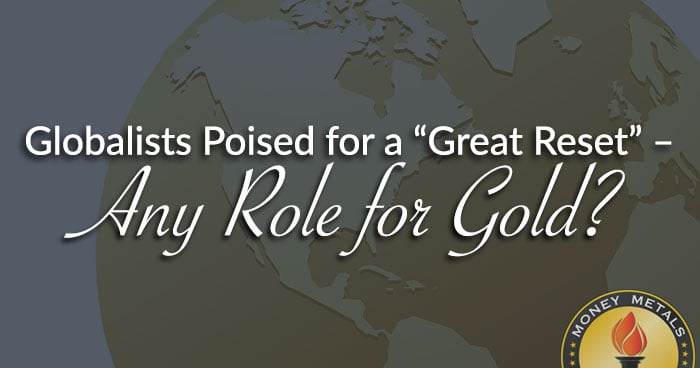Although the apparent results of the 2020 election are still being contested, members of the global ruling elite are already looking forward to a post-Trump era in American politics – and a post-vaccine world economy.
They have encapsulated their policy agenda for 2021 and beyond into two words: “Great Reset.”
The notion of a Great Reset comes directly from the World Economic Forum.
The globalist organization has been actively pushing it for months via a series of policy articles on its website.
The Great Reset agenda entails “harnessing the fourth industrial revolution” and “redrawing the geo-political map of the world” in pursuit of an “energy transition” that makes “economies more sustainable” while advancing “equity, inclusion, and social justice in the workplace” so that the global economy can “build back better.”
In essence, the Great Reset is every longstanding globalist priority rolled into one and put on an accelerated path to full implementation.
Earlier this month, Canadian Prime Minister Justin Trudeau, speaking at a United Nations video conference, said, “This pandemic has provided an opportunity for a reset… This is our chance to accelerate our pre-pandemic efforts to reimagine economic systems that actually address global challenges like extreme poverty, inequality, and climate change.”
As both Winston Churchill and Rahm Emanuel said, “Never let a good crisis go to waste.”
So what would a Great Reset mean for the monetary system?

It certainly wouldn’t mean a resetting of the U.S. dollar or any other national or regional fiat currencies to a gold standard.
Instead, the Great Reset that globalists have in mind would give central bankers more power to pursue costly and draconian environmental and social justice objectives that have traditionally been outside the scope of their mandates.
The Federal Reserve recently signaled its participation in the Great Reset by joining the Network for Greening the Financial System (NGFS), a global group of central banks and regulatory bodies dedicated to implementing the Paris climate agreement and other “green” priorities.
The Fed’s “dual mandate” of stable prices and full employment is now effectively an unlimited mandate. It includes raising price levels to impose higher rates of inflation on workers and savers.
Some gold bugs imagine a scenario where the Fed abuses its currency-creating powers to the point where the public loses confidence in the U.S. dollar, forcing the authorities to back it with gold at some extraordinarily elevated price.
The coming great monetary reset is unlikely to play out that way, however.
Central bankers and Keynesian economists dogmatically believe their theories are superior to a sound money system. They are more likely to double down – implementing a digital dollar (perhaps merged with a global currency regime) that is delinked from anything tangible, including coins and paper bills.
Gold’s role in the monetary system post-Great Reset will be to reflect its excesses and failures. In fact, the precious metal has been playing such a role ever since the U.S. moved to a purely fiat Federal Reserve note.
When the last vestiges of the classical gold standard were rescinded in 1971, gold prices traded in the low $40s per ounce. Earlier this year, the monetary metal traded up to record high prices above $2,000.
Gold prices have risen 50x over the past 50 years as a reflection of the loss of the dollar’s purchasing power.
Thus, a de facto gold standard is still in force – and will continue to be regardless of what the Great Reset brings.
Those who own precious metals are effectively making a Great Escape from the global fiat regime entirely and resetting their purchasing power in sound money. It will more reliably preserve purchasing power in the years and decades to come than any central banker-issued paper or digits.

About the Author:
Stefan Gleason is CEO of Money Metals Exchange, the company recently named "Best Overall Online Precious Metals Dealer" by Investopedia. A graduate of the University of Florida, Gleason is a seasoned business leader, investor, political strategist, and grassroots activist. Gleason has frequently appeared on national television networks such as CNN, FoxNews, and CNBC and in hundreds of publications such as the Wall Street Journal, TheStreet, and Seeking Alpha.





